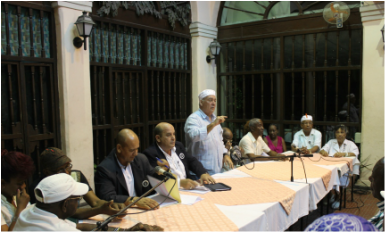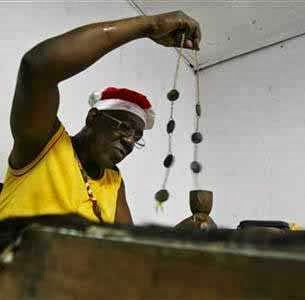There's a lot of confusion about "the letter of the year" because different versions circulate on the internet these days. For people who aren't in the religion and don't understand the practice, the logical question is: which one applies to me? People also wonder: what importance, if any, does it have for me, and where does this custom come from? What am I supposed to do with the information?

First, it's important to understand that the letter of the year is not like fortune telling or a horoscope prediction for the year. To "take out" the letter of the year is a religious ceremony done by a group of babalawos (Ifa priests) who consult Orula to determine what Odu (letra, letter or sign) will influence the energy that comes to us during the year. It's traditionally done on the evening of December 31. This is generally a community event where babalawos, olorishas ("santeros" or Orisha priests and priestesses), aleyos (people who are not initiated but interested in the religion) and family members come together to await the news. After the primary Odu is determined, the babalawos gather other information such as who the ruling Orishas are for the year, what kind of ebo (offering or sacrifice) needs to be done, and what other Odus are "witnesses" or will have some influence during the year. Based on their knowledge of Odu, its orientation and its meaning, they then interpret the "letra del año" for the general community and offer advice. The proverbs complement that advice and are used in Odu interpretation to explain the general nature of each Odu.
The first part of any letra del año will offer information that is primarily used by initiated priests and priestesses to take care of their religious obligations for the year, such as the herbs to be used in spiritual baths or cleansing ceremonies and the offerings to be made to different Orishas. Most of the language used here is in Lucumí ceremonial language (a variation on Yoruba) so it will not make sense to people who aren't familiar with it. For the most part, the general public doesn't need to be concerned about it.
The first part of any letra del año will offer information that is primarily used by initiated priests and priestesses to take care of their religious obligations for the year, such as the herbs to be used in spiritual baths or cleansing ceremonies and the offerings to be made to different Orishas. Most of the language used here is in Lucumí ceremonial language (a variation on Yoruba) so it will not make sense to people who aren't familiar with it. For the most part, the general public doesn't need to be concerned about it.

For most people, the most important aspects of the letra del año are the pieces of advice and the proverbs. These apply to everyone. They tell you what to focus on, what to avoid, what to reflect on, and offer general guidance about how to handle situations that present themselves during the year. These are meant for analysis and reflection. People are encouraged to talk about the information and consider how it can be used in their own lives. If you have a godparent in the religion, you would have conversations with your godparent about the letra del año and you would clarify any doubts you have about it. If you don't have a godparent, you can still reflect on the advice and apply it as you see fit. Most of it is common sense and not hard to understand.
So, which letra del año applies to you? If you belong to a religious house and have a godparent, you'll follow the letra del año that your godparent indicates is best for you. Some people are attached to a particular letra del año by geographical location - if you live in Miami, you go by the Miami letra - and some people are attached to a letra by their religious affiliation with a particular lineage - I made Ocha in Palmira, Cuba, so that's the letra I go by, regardless of where I live. There is really no "right" or "wrong" way to apply the letra del año. Some people look at several of them and try to find common threads. Others prefer to stick to one and ignore the others.
So, which letra del año applies to you? If you belong to a religious house and have a godparent, you'll follow the letra del año that your godparent indicates is best for you. Some people are attached to a particular letra del año by geographical location - if you live in Miami, you go by the Miami letra - and some people are attached to a letra by their religious affiliation with a particular lineage - I made Ocha in Palmira, Cuba, so that's the letra I go by, regardless of where I live. There is really no "right" or "wrong" way to apply the letra del año. Some people look at several of them and try to find common threads. Others prefer to stick to one and ignore the others.

In Cuba, the letra del año is traditionally done by Babalawos, via Ifa divination with Orula. There are communities around the world, however, where olorishas take out the letter of the year for their community. Whether it can only be done by babalawos, or also by olorishas, is a point that's hotly debated. My advice, if you are in doubt, is to follow the instructions of your godparent if you have one, and if you don't, you can safely choose any letra del año that's done by a long-established community of babalawos, such as the one from Palmira or the one from Havana. In Palmira, for example, babalawos have pulled the letter of the year without interruption each December 31, since the year 1927. Although it's not widely published and circulated outside of Cuba (due to the lack of technology on the island), it is a highly respected tradition, stemming back to the days when Tatá Gaitán and Cundo Sevilla, along with other famous babalawos, took out the letter together.
How does it apply to you? The letra del año isn't directed at any one individual so it's not a personalized reading. It describes the energy and the situation that an entire group of people may face during the year. You may be part of the group, or you may be an exception to it. Others may experience problems with health, but your health will be fine. Again, the letra del año is not fortune telling. It's not predicting that you, specifically, will get sick. But it says that there will be a likelihood of a specific kind of sickness or health problem in your community or in the world, for example, many bad cases of flu or an outbreak of an infectious disease. You should be aware of the possibility and take precautions - get a flu shot or see your doctor, wash your hands often- and you may not be exposed to anything, so you will be fine. But others around you will be sick. If you are forewarned that there is a tendency toward a certain kind of problem, you can take steps to avoid that problem in many cases.
How does it apply to you? The letra del año isn't directed at any one individual so it's not a personalized reading. It describes the energy and the situation that an entire group of people may face during the year. You may be part of the group, or you may be an exception to it. Others may experience problems with health, but your health will be fine. Again, the letra del año is not fortune telling. It's not predicting that you, specifically, will get sick. But it says that there will be a likelihood of a specific kind of sickness or health problem in your community or in the world, for example, many bad cases of flu or an outbreak of an infectious disease. You should be aware of the possibility and take precautions - get a flu shot or see your doctor, wash your hands often- and you may not be exposed to anything, so you will be fine. But others around you will be sick. If you are forewarned that there is a tendency toward a certain kind of problem, you can take steps to avoid that problem in many cases.

Some people get an individual reading for the year (a "consulta"), done by a babalawo or olorisha who is trained as a diviner. These will be much more specific to you, of course, and you can then dovetail what you learn from your individual reading with what the general letra del año says, to get a more explicit idea of what you might experience during the coming year.
In divination, all Odu will come with "osorbo" (obstacles, problems) or "iré" (blessings). This year, the letra del año from Palmira comes with osorbo. That's not to say the year will be terrible for everyone. The diviners offer remedies and advice for how to avoid problems, and if you make ebó and follow the advice, you may well be spared. Just because arguments and unrest are predicted for the general community, you don't have to be a part of that. If you maintain a cool head and act in a respectful way toward people, you can help yourself, your family, and your community overcome or avoid that problem. A year that comes with osorbo generally means we'll have to work harder and try harder to accomplish our goals, maintain good health, and find prosperity. It's not impossible, but it's not going to fall out of the sky and land in our lap. Many babalawos will tell you that when an Odu comes in iré (with blessings) people are overconfident that all is well and they let down their guard, they stop trying so hard, and they don't make their best effort. Iré can disappear in the blink of an eye. But when a sign comes in osorbo, people are more conscious of the need to do their part to overcome obstacles, they build stronger character and learn resistance, which can help them in the long run to have a better life.
Over the course of the next few weeks, I'm going to talk about some of the proverbs and patakis associated with this sign and how they might apply to our lives in the coming year. Check back!
In divination, all Odu will come with "osorbo" (obstacles, problems) or "iré" (blessings). This year, the letra del año from Palmira comes with osorbo. That's not to say the year will be terrible for everyone. The diviners offer remedies and advice for how to avoid problems, and if you make ebó and follow the advice, you may well be spared. Just because arguments and unrest are predicted for the general community, you don't have to be a part of that. If you maintain a cool head and act in a respectful way toward people, you can help yourself, your family, and your community overcome or avoid that problem. A year that comes with osorbo generally means we'll have to work harder and try harder to accomplish our goals, maintain good health, and find prosperity. It's not impossible, but it's not going to fall out of the sky and land in our lap. Many babalawos will tell you that when an Odu comes in iré (with blessings) people are overconfident that all is well and they let down their guard, they stop trying so hard, and they don't make their best effort. Iré can disappear in the blink of an eye. But when a sign comes in osorbo, people are more conscious of the need to do their part to overcome obstacles, they build stronger character and learn resistance, which can help them in the long run to have a better life.
Over the course of the next few weeks, I'm going to talk about some of the proverbs and patakis associated with this sign and how they might apply to our lives in the coming year. Check back!
 RSS Feed
RSS Feed
